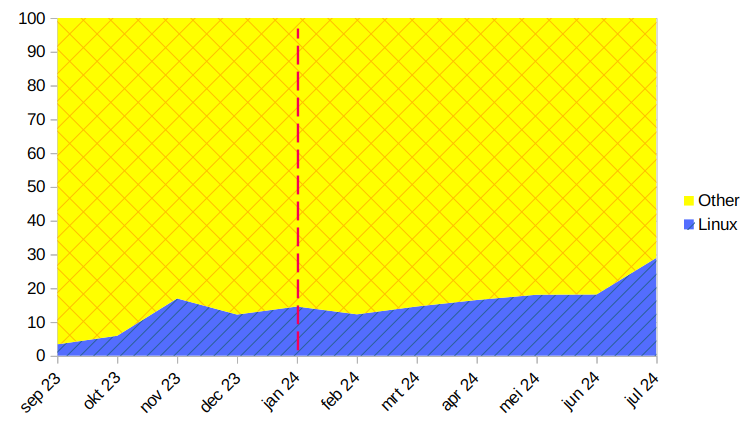this post was submitted on 01 Aug 2024
775 points (98.9% liked)
Linux
47233 readers
792 users here now
From Wikipedia, the free encyclopedia
Linux is a family of open source Unix-like operating systems based on the Linux kernel, an operating system kernel first released on September 17, 1991 by Linus Torvalds. Linux is typically packaged in a Linux distribution (or distro for short).
Distributions include the Linux kernel and supporting system software and libraries, many of which are provided by the GNU Project. Many Linux distributions use the word "Linux" in their name, but the Free Software Foundation uses the name GNU/Linux to emphasize the importance of GNU software, causing some controversy.
Rules
- Posts must be relevant to operating systems running the Linux kernel. GNU/Linux or otherwise.
- No misinformation
- No NSFW content
- No hate speech, bigotry, etc
Related Communities
Community icon by Alpár-Etele Méder, licensed under CC BY 3.0
founded 5 years ago
MODERATORS
you are viewing a single comment's thread
view the rest of the comments
view the rest of the comments

European governments will do this thing where they pass some law that says they have to take bids from local vendors for systems, olafs computer service will put in a bid with some free software system, the government will take them up on it, spend a bunch of money trying to integrate it into their existing systems with varying degrees of success then parlay abandoning it for their majority provider in exchange for avoiding cost increases or some free support/equipment.
I think Germany’s done it twice now.
The EU requires government acquisitions to be publicly announced so that private companies can make offers that the government then must choose from (not freely, mind you, but following some "objective" metrics).
Even though this might sound great to some, it has the downside of promoting commercial services and vendor lock-in up to the point that even if a free and open source alternative exists, it cannot be used unless there also exists some commercial entity behind it that can sell the software and support for it in accordance with the established metrics.
This might be one of the biggest hurdles in the way for Linux adoption, since anyone can claim to do lots of great stuff with SUPERproprietarySOFTWARE^TM^ and then hold critical services, like healthcare mentioned elsewhere, hostage to their failure to deliver on promises and future bad support.
Even more important, a huge multinational like Microsoft can be forced in court to provide the support they sell under threat of legal action that would cripple their profitability in the region. Olafs computer service will just turn its pockets inside out, flip around the shingle to closed and leave the national drivers license agency in a lurch.
On some level the companies that sell and support systems government relies on have to be treated as nation states themselves in order to maintain normalcy, which both parties “want”.
I in general very much support requiring paying for support. I.e. SLAs with consequences for not meeting targets support.
At least for software/hardware running things that can't afford indefinite unauthorized access or downtime if left in a vulnerable state. (Some stuff actually can IMHO be like that).
I also think governments should have justify renting software insteading buying it if the money is intended to be an investment of any kind.